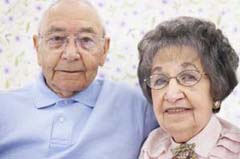8 Signs it is Time for Elder Care
 One of the most difficult tasks families of seniors face is deciding when it’s time to explore elder care options. Ideally, we’d all prefer our loved ones be able to live completely independently in their own homes for their entire lives. But sometimes, that’s not realistic. No one wants to feel like they are “rushing Mom and Dad into a nursing home,” yet we also don’t want our elders endangered or genuine care needs neglected.
One of the most difficult tasks families of seniors face is deciding when it’s time to explore elder care options. Ideally, we’d all prefer our loved ones be able to live completely independently in their own homes for their entire lives. But sometimes, that’s not realistic. No one wants to feel like they are “rushing Mom and Dad into a nursing home,” yet we also don’t want our elders endangered or genuine care needs neglected.
So how do you know when to consider a caregiver or senior community? Here are some signs to watch for:
- Accidents and Injuries: Falls and traffic accidents are two of the most common sources of injury to people 65 and older and they can be a sign of physical or cognitive issues. If simply turning in the car keys or rearranging the house to be more safe and accessible is no longer enough, it may be time to consider in-home help or a senior care community.
- Weight Changes: Sudden or dramatic weight gains or losses can be a symptom of illness or a sign your loved one needs help with meal preparation, remembering to eat, or depression.
- Significant Personality Changes: Decreased interest in people or activities that have always been important to a senior, moodiness, paranoia or other unusual or inappropriate behaviors can be the result of medications, depression, dementia, or illness―all of which signify a need for care.
- Physical Impairments and/or Disease: Complex care needs can be overwhelming or require a skilled professional. Even if the illness or impairment is temporary, your loved one may need assistance for the time they are ill.
- Decreasing Hygiene: Loss of physical ability, depression, and dementia are common reasons why some seniors become uncharacteristically dirty or messy. Your loved one likely needs help to restore his or her dignified lifestyle.
- Symptoms of Alzheimer’s or Dementia: Trouble focusing, remembering, and processing information can be early signs of cognitive issues that require assistance.
- Risky Financial Behaviors: Forgetting to pay bills or paying them twice, gambling, compulsive shopping, or falling prey to scammers can all be signs your loved one needs financial oversight.
- Family is Overwhelmed: Sometimes, caring for an elderly person requires more time, medical training, or energy than the family is able to provide. This can be especially true when family members are also caring for younger children and jobs, or have special needs of their own. Although it’s common to for people to feel they have failed their loved ones in situations like these, is it can actually be safer and healthier for the whole family if the older person moves to a care home.
If you are seeing any of these signs or symptoms in a senior, the first step is a doctor visit to determine if there are underlying medical issues needing attention. Then, figure out if there are solutions to these problems that can be safely and effectively implemented at home. Some seniors can remain independent longer with the aid of assistive devices or by getting help with cleaning, cooking and other daily activities. If your loved one will need on-going or higher-level care, or if living alone is simply too lonely, consider an elder care community like Victorian Quality Elder Care.
If you have questions about your loved one’s individual situation or are looking for adult foster care in West Linn, either e-mail Ileana or call her at 503-656-4774.

